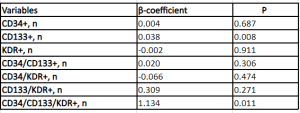Context: Endothelial progenitor cells (EPCs) are involved in endothelial homeostasis. In people with type 1 diabetes (T1D) there is impairment of both count and function EPC. Recent evidence shows that the calcitriol, the active vitamin D hormone, has favorable effects on the endothelial health. There are limited data on the relationship of vitamin D with EPCs count in people with T1D. Aim: To investigate the existence of an association between EPCs count and vitamin D status in a cohort of adults with T1D. Methods. This cross-sectional study included adults with T1D, treated with intensive insulin therapy and continuous glucose monitoring devices. Seven subpopulations of EPCs were determined by flow cytometry on the basis of the surface expression of CD34, CD133, and KDR antigens. Vitamin D (25-OHD) levels were assessed by a chemiluminescent immunoassay. The population included was stratified according to vitamin D status as insufficient (serum vitamin D concentration of 20-30 ng/ml) and deficient (<20 ng/ml). Results: Sixty-four adults (median age 24.0 years), of whom 32 had Vitamin D deficit, were included. Compared with adults with insufficient vitamin D status, participants with vitamin D deficit showed lower circulating levels of CD34/CD133/KDR+ cells [deficient vs insufficient vitamin D status, median (IQR), 2.0 (1.5-4.0) vs 4.5 (2.0-6.0), p=0.001)]. Linear regression analysis showed that Vitamin D was positively associated with CD34/CD133/KDR+ levels (β=1.134, p=0.011) and CD133 cells (β=0.038, p=0.008). Conclusions: Adults with T1D and vitamin D deficit showed lower CD34/CD133/KDR+ count. Moreover, vitamin D status was associated with CD133 and CD34/CD133/KDR+ levels. Future studies are needed in order to better clarify the role of vitamin D status in endothelial health according to EPCs count and function.


